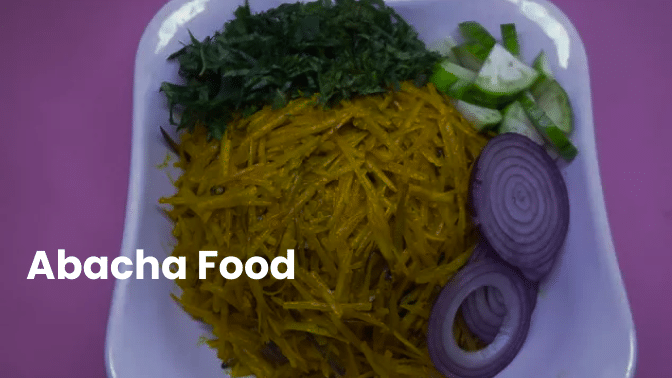Originating from the Eastern part of Nigeria, abacha, also known as African salad, is a traditional and nutritious dish that has delighted the palates of Nigerians for generations. In this blog post, we’ll explore the history and cultural significance of abacha, discuss its key ingredients and preparation methods, and highlight regional variations and modern twists on this classic Nigerian dish.
Key Ingredients
At its core, abacha is made from cassava tubers that have been processed, cooked, and then thinly sliced to create a unique, chewy texture. The dish is typically garnished with an array of flavorful and nutrient-dense ingredients, including:
- Ukpaka (oil bean)
- Ugba (ukpaka seeds)
- Garden egg
- Crayfish
- Stockfish
- Kpomo (cow skin)
- Seasonings and spices, such as salt, pepper, and ground Ehu seeds (Calabash Nutmeg)
Traditional Recipe and Preparation
Preparing abacha begins with soaking the dried abacha in cold water until it softens. It’s then boiled or soaked in hot water to further soften the texture. Meanwhile, the ugba (ukpaka seeds) is washed and sliced into thin strips. The sliced kpomo, stockfish, and crayfish are also prepared and set aside.
In a large pot, palm oil is heated and combined with a mixture of ground Ehu seeds, pepper, and crayfish. This forms the base of the dish. Once the oil mixture is fragrant, the softened abacha, ugba, and sliced kpomo are added, along with the stockfish and other seasonings. The dish is stirred thoroughly and allowed to simmer for a few minutes to ensure the flavors meld together.
Read Also: The Incredible Benefits of Yogurt for Females: A Superfood You Can't Ignore
Nutritional Benefits
Abacha is not only delicious but also packed with nutritional benefits. It is rich in carbohydrates, fiber, and essential vitamins and minerals. The dish also provides a healthy dose of protein from ingredients such as crayfish and stockfish. However, it’s important to note that abacha is relatively high in calories and should be enjoyed in moderation as part of a balanced diet.
Some of the Nutrient Include:
- Carbohydrates: As a cassava-based dish, abacha is a good source of carbohydrates, providing energy for the body.
- Fiber: The cassava in abacha contributes to its fiber content, which aids in digestion and helps maintain a healthy gut.
- Protein: Ingredients like crayfish, stockfish, and kpomo (cow skin) provide a healthy dose of protein, which is essential for building and repairing muscles, tissues, and organs.
- Vitamins and minerals: Abacha contains various vitamins and minerals from its ingredients, such as:
- Vitamin A: found in palm oil and garden egg, supports eye health, immune function, and skin health.
- Vitamin C: found in garden egg, supports the immune system, wound healing, and collagen production.
- Vitamin E: present in palm oil, acts as an antioxidant and supports skin health.
- Iron: found in crayfish and stockfish, is crucial for the production of hemoglobin and proper oxygen transport in the body.
- Calcium: found in crayfish and stockfish, is essential for maintaining strong bones and teeth, as well as supporting muscle function and nerve signaling.
- Healthy fats: Palm oil, a key ingredient in abacha, contains unsaturated fats that can help support heart health.
It’s important to remember that while abacha offers several nutritional benefits, it is relatively high in calories and should be enjoyed in moderation as part of a balanced diet.
Regional Variations
Abacha is predominantly associated with the Igbo ethnic group in Eastern Nigeria. However, variations of the dish can be found in different parts of the country. Some regional recipes may include additional ingredients such as mackerel, smoked fish, or sliced onions to enhance the flavor and texture.
Modern Twists on Abacha
With the growing popularity of Nigerian cuisine around the world, contemporary chefs are finding innovative ways to reinvent traditional dishes like abacha. Some modern adaptations include adding grilled chicken, shrimp, or vegetables to cater to different dietary preferences. There are also vegetarian and vegan alternatives that substitute the animal-based ingredients with plant-based proteins and vegetables.
Pairings and Accompaniments
Abacha can be enjoyed as a standalone dish or served with a variety of Nigerian beverages and side dishes. Some popular accompaniments include palm wine, zobo (a hibiscus-based drink), and moi moi (a steamed bean pudding). Traditional serving methods may include presenting the dish on a banana leaf or communal platter.
Celebrations and Events Featuring Abacha
Abacha is often served at festivals, ceremonies, and community gatherings as a symbol of unity and celebration. Its preparation and consumption are an integral part of Nigeria’s rich culinary heritage and serve to strengthen communal bonds.
Abacha in Nigerian Cuisine
Abacha holds a special place in Nigeria’s culinary landscape, standing alongside other popular dishes such as jollof rice, pounded yam, and suya. Its unique combination of flavors, textures, and nutritional benefits make it a staple in the Nigerian diet and a beloved dish by locals and visitors alike. The growing international interest in Nigerian cuisine has also helped introduce abacha to a wider audience, showcasing the culinary traditions of the country.
Conclusion
The lasting appeal of abacha lies in its rich history, cultural significance, and delightful combination of flavors and textures. As Nigerian cuisine continues to gain global recognition, abacha stands as a testament to the country’s culinary creativity and resilience.
By preserving and adapting traditional recipes, we can ensure that dishes like abacha remain an essential part of Nigeria’s culinary legacy for generations to come. So, whether you’re a seasoned abacha enthusiast or a curious food explorer, there’s never been a better time to dive into the flavors and traditions of Nigeria through this remarkable dish.
